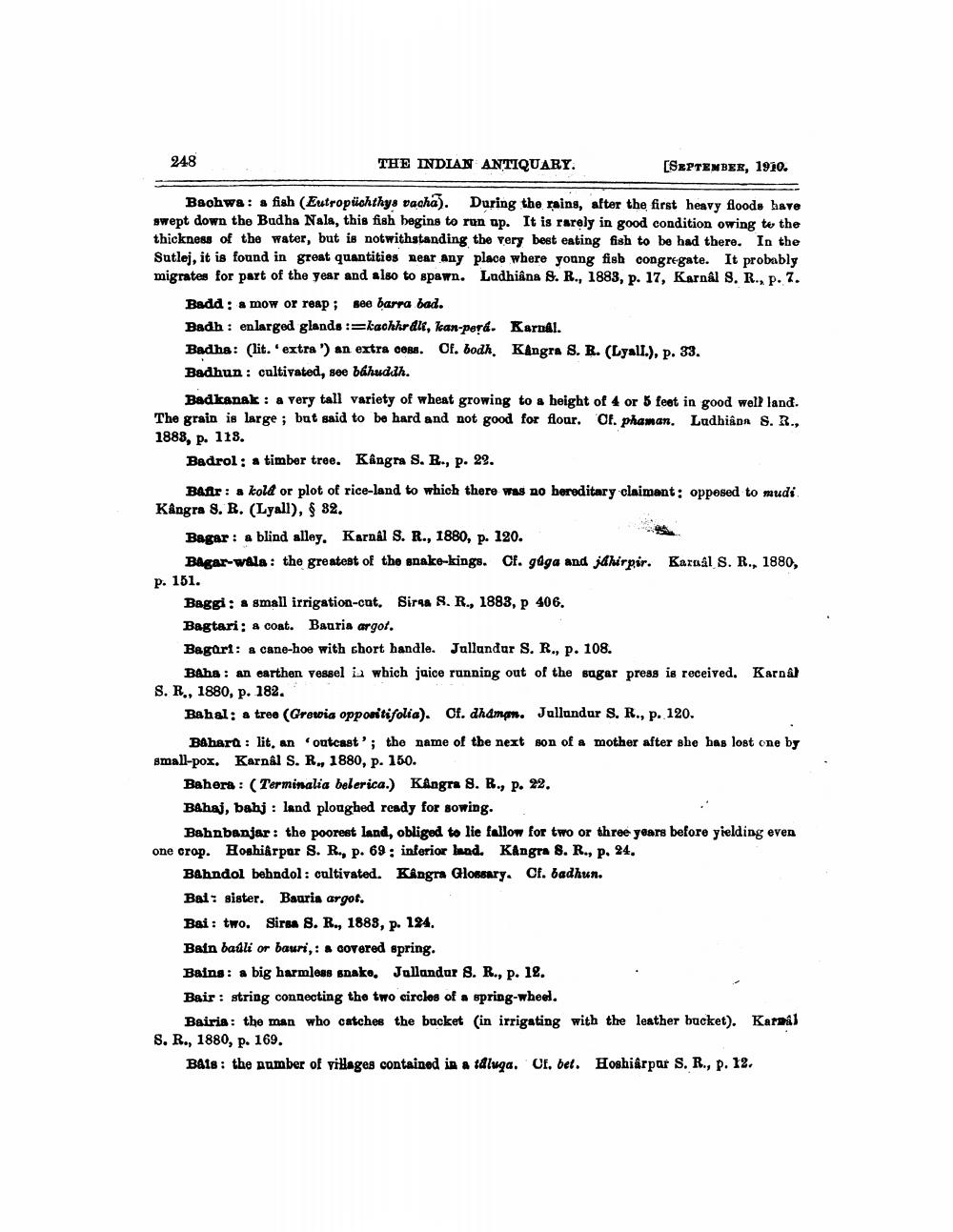________________
248
THE INDIAN ANTIQUARY.
[SEPTEMBER, 1910.
Bachwa: a fish (Eutropüchthys vacha). During the rains, after the first heavy floods have swept down the Budha Nala, this fish begins to run ap. It is rarely in good condition owing to the thickness of the water, but is notwithstanding the very best eating fish to be had there. In the Sutlej, it is found in great quantities near any place where young fish congregate. It probably migrates for part of the year and also to spawn. Ludhiâna 8. R., 1883, p. 17, Karnál S. R., p. 7.
Badd : a mow or reap; see barra bad. Badh : enlarged glands :=kachhrdle, kan-pera. Karnal. Badhe: (lit. extra ') an extra coss. Of. bodh. Kangra S. R. (Lyall.), p. 33. Badhun: cultivated, see bahuddh.
Badkanak: a very tall variety of wheat growing to a height of 4 or 5 feet in good wel land. The grain is large ; but said to be hard and not good for floar. Of. phaman. Ladhiên S. R., 1888, p. 113.
Badrol: a timber tree. Kangra S. B., p. 29.
Bafr: a kold or plot of rice-land to which there was no bereditary claimant: opposed to mudi Kångra 8. R. (Lyall), § 82.
Bagar: a blind alley. Karnal S. R., 1880, p. 120.
Bagar-wala: the greatest of the snake-kings. Cf. gåga and jdkirpir. Kargal S. R., 1880, p. 151.
Baggi: a small irrigation-cnt. Sirga 8. R., 1888, p 406. Bagtari; a coat. Bauria argot. Bagart: a cane-hoe with short handle. Jallandar S. R., p. 108.
Baha: an earthen vessel ia which juice running out of the sugar press is received. Karnal S. R., 1880, p. 182.
Bahal: a tree (Greria oppositifolia). Cf. dhaman. Jollandur S. R., p. 120.
Baharu : lit. an outcast'; the name of the next son of a mother after she has lost one by small-pox. Karnål S. R., 1880, p. 150.
Bahera : (Terminalia belerica.) Kangra 8. R., p. 22. Bahaj, bahj : land ploughed ready for sowing.
Bahnbanjar: the poorest land, obliged to lie fallow for two or three years before yielding even one crop. Hoshiarpar S. R., p. 69: inferior land. Kangra 8. R., p. 24.
Bahndol behndol: cultivated. Kangra Glossary. Cl. badhun. Bai: sister. Bauria argot. Bai: two. Sirsa 8. R., 1883, p. 124. Bain badli or bauri, : & covered spring. Bains : a big harmless sako, Jollandur 8. R., p. 12. Bair : string connecting the two circles of spring-wheel.
Bairia: the man who catches the backet (in irrigating with the leather bucket). Karnal S. R., 1880, p. 169.
BAIS: the number of viHages contained in a tlluga. Cf. bet. Hoshiarpur S. R., p. 12.




